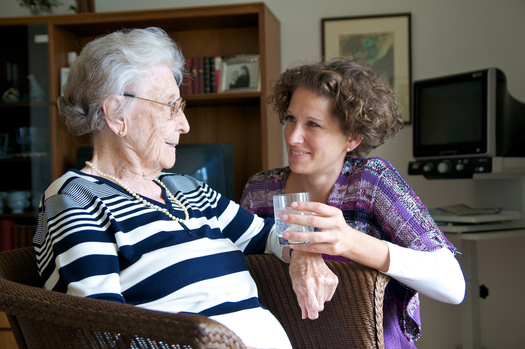As Alzheimer’s progresses, the condition can take a toll on communication skills. Caregivers often need to devise new ways to communicate with their aging parents. Here are a few tips to help you successfully interact with a senior loved one with Alzheimer’s.
Be Aware of Body Language & Tone of Voice
As memory loss becomes more severe, seniors with Alzheimer’s may have difficulty parsing conversations. They may not be able to retain new information from sentence to sentence, making comprehension difficult. If your loved one can’t understand the words you’re saying, he or she may take cues from your body language and tone of voice.
To make your parent feel comfortable, make sure to use a gentle tone of voice. Avoid any physical gestures that could startle or frighten your loved one. Don’t begin a conversation from behind your loved one’s back, as he or she may have a difficult time processing where the sound of your voice is coming from. Instead, soothe your loved one’s anxious nerves by making eye contact as you speak to him or her. If your parent responds positively to touch, consider holding his or her hand as you speak.
A trained caregiver with experience in caring for seniors with Alzheimer’s can be a fantastic resource for family members. Families looking for top-rated in-home care providers can reach out to Home Care Assistance. From respite care to specialized Alzheimer’s, dementia, stroke, and Parkinson’s care, there are many ways we can make life easier for seniors and their loved ones.
Don’t Interrupt
Seniors with Alzheimer’s may not understand the finer points of conversation, but they do understand they’re having difficulty doing something they used to do with ease. Every time you try to talk to your loved one, he or she is confronted with this frustrating fact.
To encourage two-way communication, take steps to diminish your parent’s frustrations. Treating your loved one with respect is one of the best ways to accomplish this. When you ask a question, allow the time your loved one needs to come up with a response. Don’t speak over your parent or interrupt as he or she speaks. These actions could frustrate your loved one further, leading to a breakdown in communication.
Professional caregivers with training and expertise in Alzheimer’s care can often identify the sources of seniors’ communication issues and respond effectively and compassionately. Aging adults with Alzheimer’s disease can benefit from receiving professional Alzheimer’s care. Barrie seniors need regular mental stimulation when managing memory-related conditions, and a reliable in-home caregiver who has extensive training in Alzheimer’s care can be a great asset.
Use Positive Language
When possible, try to refrain from using negative language. It’s natural for seniors with Alzheimer’s to make mistakes, but when you correct your loved one, try to find positive ways to express yourself. For example, if your parent is trying to put a shirt on backward, refrain from using negative sentence constructions such as “Don’t put your shirt on that way.” Instead, opt for positive instructions, such as “Try putting your shirt on this way!” Instructions that use negative language can make seniors feel ashamed of their limitations, and positive language can reduce these feelings of shame.
Ask Questions with Simple Answers
When possible, give your loved one the chance to make decisions. Even if those decisions are about simple things—like what to eat for lunch or which shirt to wear—making decisions may help your loved one feel actively involved in his or her own life. When you phrase questions, try to put them in a yes/no format. Offer specific options rather than asking open-ended questions. Ask “Do you want to wear the blue shirt?” rather than “Which shirt do you want to wear today?”
If your loved one with Alzheimer’s has difficulty with comprehension or letting you know his or her needs, these suggestions can help you understand and communicate better with him or her. Caring for a senior loved one can be challenging for families who don’t have expertise or professional training in home care, but this challenge doesn’t have to be faced alone. Family caregivers can turn to Barrie Home Care Assistance for the help they need. We provide high-quality live-in and respite care as well as comprehensive Alzheimer’s, dementia, stroke, and Parkinson’s care. Trust your loved one’s care to the professionals at Home Care Assistance. Reach out to one of our compassionate Care Managers today at 647-970-3803.
